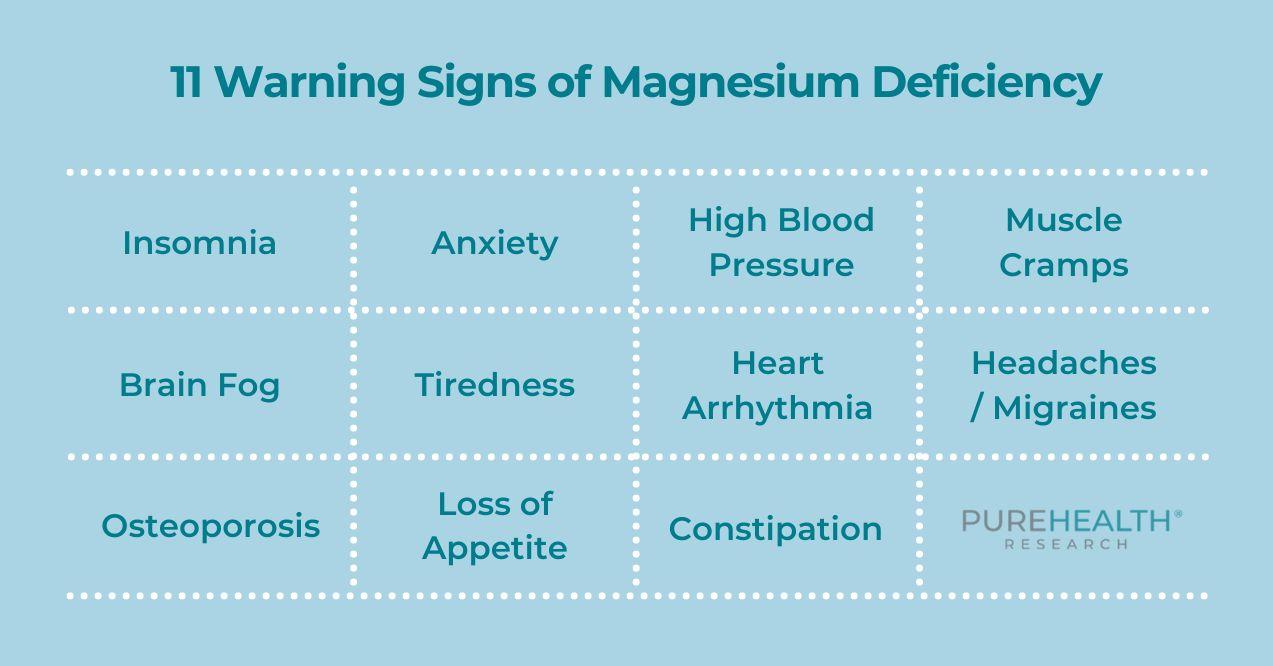11 Warning Signs of Magnesium Deficiency
Medically reviewed by our experts


Let’s talk about 11 warning signs of magnesium deficiency. Magnesium does a lot of good for our bodies. People even call it the “miracle mineral” because of its role in more than 300 different bodily functions, like helping our muscles work, producing energy, building strong bones, and keeping our nerves in check. Despite how crucial it is, many people fail to realize they might not be getting enough magnesium, which can lead to various health problems.
Now, magnesium isn’t just hanging out doing nothing — it’s a helper for enzymes doing essential jobs in our body. These jobs include making DNA, RNA, and proteins — the building blocks of life. Magnesium also steps in when our muscles need to contract, our nerves need to communicate, and our heart wants to beat steadily. It’s a real multitasker!
So, to ensure we have the right amount of magnesium, we need to eat foods rich in it. Think leafy green veggies like spinach, kale, nuts, seeds, whole grains, and legumes. Even though magnesium is in many foods, many people might not get as much as they need every day. That’s why paying attention to the 11 warning signs of magnesium deficiency is crucial. Let’s dive into this article and help you understand when your body might be asking for more magnesium so you can keep yourself feeling your best.
What Are the Risk Factors for Magnesium Deficiency?
Feeling off lately? It might be more than just a bad day; your body could be signaling a lack of magnesium, a mineral crucial for several bodily functions. Let’s explore the potential risks associated with magnesium deficiency, helping you understand why keeping this mineral in check is vital for your overall health.
- Muscle Cramps and Spasms – Picture your muscles as an orchestra with magnesium as the conductor. Without it, the performance might include unexpected cramps and spasms.
- Fatigue and Weakness – Magnesium is like your body’s energy production fuel. Low levels can leave you feeling more tired and weaker than usual.
- Nausea and Vomiting – Magnesium deficiency can throw your digestive system out of tune, causing sensations of nausea and, in some cases, leading to vomiting.
- Abnormal Heart Rhythms – Your heart’s rhythm is delicate, and magnesium is critical for the proper functioning of this organ. A shortage can lead to irregular heart rhythms, which is a serious concern.
- Tingling or Numbness – Low magnesium levels may make your nerves go haywire, resulting in sensations of tingling or numbness, especially in your extremities.
- Personality Changes – Surprisingly, magnesium deficiency can influence your mood and personality, potentially contributing to feelings of anxiety or depression.
- Seizures – In severe cases, insufficient magnesium can lead to seizures, underscoring its crucial role in maintaining healthy nerve function.
- Bone Weakness – Think of magnesium as the architect of your bone health. Without enough, your bones might lose their structural integrity and become more susceptible to fractures.
- High Diastolic Pressure – Research suggests a connection between low magnesium levels and high-pressure levels, emphasizing the role of this mineral in pressure regulation.
- Complications During Pregnancy – Pregnant women deficient in magnesium may face complications such as preeclampsia, preterm labor, or restricted fetal growth.
Warning Signs of Magnesium Deficiency

Struggling with insomnia, feeling more anxious than usual, or battling persistent muscle cramps? These could be more than just passing inconveniences; they might be subtle signals from your body about a potential magnesium deficiency. Let’s explore 11 warning signs of magnesium deficiency and understand why they occur, unveiling the intricate relationship between magnesium levels and our overall well-being.
1. Insomnia
Have you ever found yourself tossing and turning, unable to catch a good night’s sleep? That could be more than just daily stress; it might be a subtle signal from your body about potential magnesium deficiency. Magnesium is like the backstage manager for neurotransmitters involved in sleep, including the sleep-inducing melatonin. When magnesium levels dip, it can throw off your usual sleep routine, causing disturbances during your peaceful sleep time. So, if you’re wrestling with insomnia, it might be worth considering whether magnesium is playing a part in your quest for restful slumber.
2. Anxiety
Feeling more on edge lately? Magnesium might have a role to play in that emotional rollercoaster. It’s like the peacekeeper of your nervous system, regulating neurotransmitters that influence your mood. But when magnesium is in short supply, it can throw this delicate balance into disarray, leading to increased brain excitability that could translate into symptoms of anxiety. Think of magnesium as the soothing balm for your nervous system — its calming effect is key to keeping your emotions in check and maintaining your overall well-being.
3. High Blood Pressure
Magnesium is like a chill pill for your blood vessels, making them relax and keeping your diastolic pressure in check. But if magnesium is missing in action, your vessels might tighten up, adding to the pressure on your heart. It’s not just about vessel vibes — magnesium also plays referee with electrolytes.
When magnesium is low, the electrolyte balance in your body breaks, factoring into symptoms of high blood pressure. So, think of magnesium as the peacekeeper that ensures your blood vessels stay relaxed and the electrolyte dance stays in harmony, all contributing to a healthier blood circulation pressure.
4. Muscle Cramps
Magnesium acts as a backstage crew for your muscles, helping them dance between contraction and relaxation. When magnesium is scarce, it throws off the rhythm — muscles start contracting unexpectedly, leading to those dreaded cramps. Keeping magnesium levels in check is crucial for your muscles’ performance in perfect harmony.
5. Brain Fog
Ever experienced “brain fog”? Blame it on magnesium. It’s the director for neurotransmitters that keep your brain sharp. But if magnesium is low, the script goes haywire, causing concentration and memory hiccups. Consider magnesium as the brain’s maestro; keeping it in tune ensures clear mental harmony.
6. Tiredness
Magnesium is like the energy wizard inside your cells, helping create ATP, the cell’s power currency. When magnesium is in short supply, the magic falters. ATP production takes a hit, leaving you with less energy and a bit more fatigue and weakness. Keep that magnesium wand waving for vitality.
7. Heart Arrhythmia
Magnesium is crucial for maintaining the electrical balance in the heart. A deficiency can disrupt this balance, potentially leading to irregular heart rhythms or arrhythmias. The heart’s electrical system relies on the precise coordination of ions, and magnesium deficiency may interfere with this coordination.
8. Headaches and Migraines
Magnesium is paramount in blood vessel dilation and neurotransmitter regulation, both of which play a role in headache and migraine development. Insufficient magnesium levels may contribute to blood vessel constriction and heightened pain sensitivity, increasing the likelihood of pesky headaches and migraines.
9. Osteoporosis
Magnesium is a vital component of bone structure and plays a role in bone mineralization. Magnesium deficiency may compromise bone density and contribute to the development of osteoporosis. A lack of this mineral can also interfere with regulating calcium and vitamin D, both essential for bone health.
10. Loss of Appetite
Among the 11 warning signs of magnesium deficiency, appetite loss is arguably the most common in adults. Magnesium deficiency can impact the function of the gastrointestinal tract, leading to a severe loss of appetite. Additionally, this mineral is also essential for the release of hormones that regulate hunger and satiety. A deficiency of it may disrupt these hormonal signals, affecting appetite control.
11. Constipation
Magnesium has a laxative effect and helps regulate bowel movements by promoting muscle contractions in the intestines. Insufficient magnesium levels can lead to constipation, as the normal rhythmic contractions of the digestive muscles may be compromised.
Does Magnesium Give You a Headache?

The idea that magnesium, a mineral celebrated for its health benefits, might actually trigger headaches seems paradoxical. However, scientific studies into this claim reveal a more nuanced picture. There’s a prevailing notion that magnesium supplementation can cause headaches, but the evidence supporting this claim is inconclusive.
Some studies suggest that a rapid increase in magnesium levels might have an association with headaches in some individuals. This rapid influx of magnesium can affect blood vessel dilation and neurotransmitter regulation, potentially influencing headache development. On the flip side, numerous studies highlight magnesium’s potential in headache prevention. Individuals prone to migraines often exhibit lower magnesium levels, and supplementation of this mineral is often explored as a way to reduce the frequency and intensity of this condition.
It’s essential to consider individual variations in responses to magnesium supplementation. Some people may find relief from headaches, while others might experience adverse effects. As with any supplements for energy, moderation is key. Consulting with a healthcare professional is advisable before starting magnesium supplementation, especially if you have a history of headaches or other health conditions. While the relationship between magnesium and headaches is complex and context-dependent, the general consensus leans toward magnesium being more of a potential headache ally than an adversary.
Why Does Magnesium Give Me a Headache?
Understanding the question, “Why does magnesium give me a headache?” is essential. Experiencing a headache after taking magnesium can be perplexing, but the explanation lies in the intricate interplay of individual differences, dosage, and various factors that influence this mineral’s impact on the body.
1. Individual Variations in Health, Diet, and Metabolism
Our bodies are unique, and how we respond to magnesium can be influenced by a myriad of factors. Health conditions play a crucial role; for instance, individuals with pre-existing kidney issues may have difficulty excreting excess magnesium, leading to an accumulation that could contribute to headaches.
Dietary habits also matter. A diet lacking in certain nutrients, even if it includes magnesium, might not provide the right balance needed for optimal absorption. Conversely, some individuals may already have sufficient magnesium levels from their diet, and additional supplementation might tip the balance, potentially leading to headaches.
Metabolism is another important player. The rate at which our bodies absorb and utilize magnesium can vary. Factors such as age, genetics, and overall metabolic health influence how efficiently our bodies process this mineral. Variations in them could contribute to headaches in some individuals.
2. Dosage Matters
The saying “too much of a good thing” holds true for magnesium. While magnesium is essential for various bodily functions, excessive intake can have negative effects on your organism, including headaches. Studies suggest that a rapid increase in magnesium levels, especially through intravenous administration or high-dose supplements, might increase the likelihood of headaches.
The recommended daily allowance (RDA) for magnesium varies by age and sex. Exceeding this limit can increase the chance of side effects. Beginning with a lower dosage and gradually increasing it allows the body to adjust and may reduce the risk of headaches.
3. Forms of Magnesium and Bioavailability
Not all types of magnesium are equal in terms of absorption and side effects. Magnesium oxide, for example, has a higher likelihood of causing gastrointestinal issues, which could indirectly contribute to headaches. On the other hand, some individuals may have a higher tolerance to magnesium citrate or glycinate.
The bioavailability of magnesium, or how easily the body can absorb and use it, also varies among different forms. Factors such as pH levels in the stomach, the presence of other minerals, and individual digestive health can impact how efficiently our bodies absorb it. If this mineral is not absorbed properly, it might not deliver its benefits and could potentially contribute to headaches.
When comparing magnesium citrate vs glycinate, each has its advantages. Magnesium citrate is particularly effective for those needing a gentle laxative effect, whereas magnesium glycinate is often preferred for its calming effects on the brain and its gentler impact on the stomach. Choosing between magnesium citrate vs glycinate should consider individual health needs and digestive tolerance to optimize benefits and minimize potential adverse effects.
4. Interaction With Other Dietary Elements
Magnesium doesn’t operate in isolation; it interacts with other minerals and nutrients in the body. Calcium, for instance, competes with magnesium for absorption. An imbalance in the calcium-magnesium ratio could potentially lead to headaches. Similarly, interactions with medications or other dietary supplements may influence how the body processes this crucial mineral.
Final Thoughts
Magnesium is a vital mineral that plays a critical role in over 300 bodily functions, including muscle and nerve function, energy production, and bone health. Despite its importance, many people don’t get enough magnesium, leading to a variety of health issues.
Recognizing the warning signs of magnesium deficiency, such as muscle cramps, fatigue, anxiety, and irregular heart rhythms, is essential for maintaining overall health. Incorporating magnesium-rich foods like leafy greens, nuts, seeds, whole grains, and legumes into your diet can help prevent deficiency.
If you suspect you are not getting enough magnesium, consider consulting with a healthcare professional to discuss dietary adjustments or supplementation to ensure your body functions optimally. Prioritizing magnesium intake can significantly improve your well-being and prevent the adverse effects associated with deficiency.
Low magnesium levels may hinder energy production, causing increased fatigue and weakness. It can also disrupt the digestive system, leading to sensations of nausea and vomiting. In some cases, it may result in irregular heart rhythms or arrhythmias. Low magnesium levels can cause nerve dysfunction, leading to sensations of tingling or numbness, especially in the extremities. In severe cases, insufficient magnesium can lead to seizures and compromised bone density.
The relationship between magnesium deficiency and headaches is inconclusive. While some studies suggest a potential association, others highlight magnesium’s role in preventing migraines. Individual responses vary, and factors such as dosage, magnesium form, and interactions with other elements play a role. It’s essential to consider personal health conditions and consult with healthcare professionals before drawing conclusions about magnesium’s impact on headaches.












